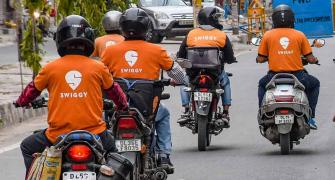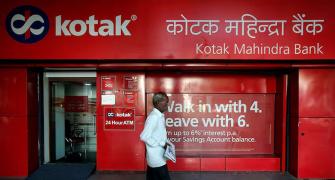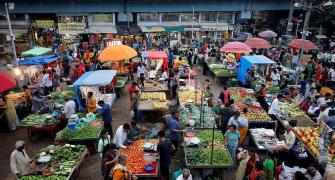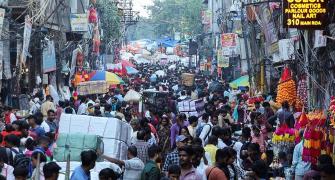 Two months ago, Michigan-based Perrigo Company, one of the world's largest over-the-counter pharmaceutical producers with over $2 billion sales, acquired 85 per cent in Mumbai-based Vedants Drugs and Fine Chemicals for nearly Rs 60 crore (Rs 600 million).
Two months ago, Michigan-based Perrigo Company, one of the world's largest over-the-counter pharmaceutical producers with over $2 billion sales, acquired 85 per cent in Mumbai-based Vedants Drugs and Fine Chemicals for nearly Rs 60 crore (Rs 600 million).
The OTC major plans to pump in millions of dollars into Vedants' manufacturing facility coming up by 2011 at Ambernath near Mumbai. Perrigo will then move production of active pharmaceutical ingredients (APIs or the key therapeutic substance in a drug) from its sites in Germany and Israel to India.
There are many mid-tier firms like Perrigo with similar plans for India. They may lack the 'sex appeal' of Big Pharma, but global drug makers such as Teva Pharmaceuticals, Watson Pharma, Lonza, Eisai Pharmaceuticals, Ethypharm and Astellas are now quietly making India a major manufacturing and research and development centre for their global operations. Their strategy is to either set up greenfield facilities or acquire small companies or plants in which they will invest further.
"It is a conscious strategy of these companies as they are new entrants into India and will prefer to learn and test the market for a few years with small investments. Once they get established, they may look at large acquisitions or big investments in greenfield facilities," said V K Singh, chief executive of Ethypharm India.
The parent company, Ethypharm of France, is the largest new drug delivery system (NDDS or cutting-edge chemistry innovations like one tablet instead of three) developer in the world and is among the first such European companies to enter India with a manufacturing and research and development centre in Mumbai.
Now, Ethypharm is making its Indian subsidiary the most important centre outside France for NDDS activities, mainly complicated chemistry NDDS products required for big pharma.
Already, the Indian subsidiary contributes 10 per cent to its global turnover. The company will soon expand the capacity of its existing facility and will lease more facilities, with a view to double turnover and triple profits within three years, said V K Singh, a former Ranbaxy executive and a veteran industry professional.
Astellas Pharma, Japan's second-largest drug company with a turnover of $10.5 billion, is planning to enter India with a similar strategy.
Astellas is now recruiting sales executives to launch its first product in India, its $2 billion flagship brand Prograf, used to prevent rejection in organ transplant patients. The product will reach the market in a few months.
"We aim to become market leaders in India within the next five years in various specialities in which we will launch our products. Our focus is to establish our own sales and marketing strength for the time being and we are not looking at local production for the next few years," said Himanshu Dave, Astellas' director, sales and marketing.
Astellas has every reason to initially tap the local market with its own imported products. India's pharmaceutical market will expand by more than 12 per cent a year to reach $20 billion by 2015, according to a McKinsey & Co analysis.
Meanwhile, Eisai Co, another leading Japanese company with annual sales of $8 billion, is making India a major manufacturing hub. Eisai, which entered India in a small way in 2004,& is now setting up a huge API and drug and formulation research facility at Jawaharlal Nehru Pharma City SEZ in Visakhapatnam, Andhra Pradesh. The facility, at an investment of $300 million to $400 million (Rs 1,400 crore to Rs 1,900 crore), will be operational by 2011.
Eisai hoped to supply drugs to markets throughout Asia, Russia and Africa from this facility, said sources.
Expertise in process chemistry-related drug development and the ability to make drugs at one-fourth the cost incurred in US and Europe have made India one of the most preferred destinations for drug manufacturing in the changing global pharmaceutical landscape, industry analysts said.
The Indian API manufacturing industry is the world's third largest and is expected to record exports of $2.8 billion by 2010, with an average yearly growth rate of 19.3 per cent, according to PricewaterhouseCoopers estimates.
Take the case of Watson Pharma, the second largest US-based generic drug maker. It acquired a manufacturing plant of Dr Reddy's Laboratories in Goa in 2005, and bought Mumbai-based API maker Sekhsaria Chemicals within a year.
After this, Watson sold its manufacturing units in Miami and divested an injectable drug making unit in Arizona. Soon the company will close another unit in New York and will move most of the production to India.
Plans are to make India the manufacturing hub for one-third of its global drug requirements. Watson now employs close to 1,000 people in India at Goa and Mumbai. The company also has a decades-old supply agreement with domestic major Cipla for many of its products sold in the US market.
"The Goa facility will produce over one billion tablets and capsules annually for the US market", said a Watson India executive. Israel's Teva Pharmaceutical Industries, the world's largest manufacturer of generics drugs with over $11 billion sales, is also making India as a major manufacturing base.
Teva, which opened an API research and development centre near Delhi a couple of years ago, bought over 100 acres of land near Gwalior in Madhya Pradesh last year. Plans are to set up API manufacturing facilities at this site that will match the production capacity of leading Indian companies.
Teva's plans are to invest close to $1 billion in India, including $300-400 million in greenfield manufacturing facilities.
Regent Drugs, a small company that it acquired from JK Industries in 2003 with its API business, now acts as a supplier to Teva's global drug requirements. Further, the company sources a good percentage of its global drug requirements from four or five suppliers in India, industry sources said.
In the last five years, the company was attempting a major acquisition in India, but could not succeed due to valuation issues, said investment banking sources.
"Teva considers India an interesting geographical region and is looking to broaden its activities in the country," Shir Altay, company spokesperson for Teva had said earlier on their India plans in an e-mail to Business Standard.








